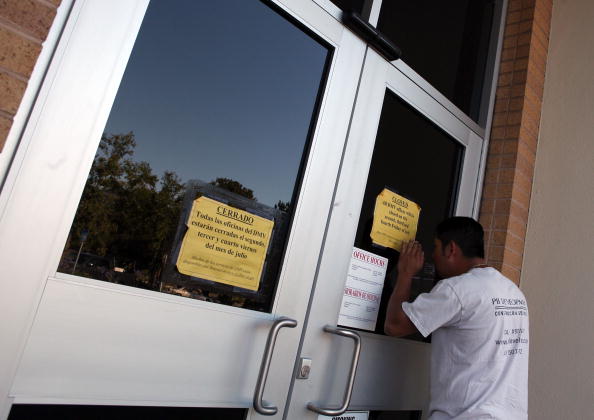Texas Officials Aim to Shutter Driver’s License Offices in Black, Hispanic Communities (Updated)
The proposal to close dozens of driver's license offices across Texas comes less than three months before November's midterm elections. Texas has a law requiring voters to show some form of ID at the polls.

UPDATE, August 30, 2:45 p.m.: The Sunset Advisory Commission on Wednesday voted to reject the Department of Public Safety’s recommendations to close 87 drivers license offices across Texas, the Dallas Morning News reports. The commission approved a plan for an outside agency to study proposal to transfer responsibility for the driver’s license program from DPS to the Texas Department of Motor Vehicles.
Texas officials are pushing to close dozens of driver’s license offices in counties with large populations of Hispanic and Black voters—a move that could have an outsize impact in a state that makes it difficult to vote without a photo ID.
The Texas counties of Zapata, Jim Hogg, Brooks, and Kenedy stretch from the U.S.-Mexico border to the Gulf of Mexico and are the gateway to the Rio Grande Valley. Residents of these mostly rural and overwhelmingly Hispanic counties either have to or may soon have to travel to another county to obtain a driver’s license.
The Texas Sunset Advisory Commission on Wednesday will consider recommendations from state agencies including the Texas Department of Public Safety (DPS), which the commission directed to “develop and implement a plan to close inefficient driver license offices.”
DPS has proposed shuttering 87 driver’s license offices around the state, with the majority of the proposed closures located in the Lubbock and San Antonio regions. The closures would leave at least 68 counties without a driver’s license office, and would disproportionately affect rural counties and communities of color.
A Rewire.News analysis found that of the 68 counties that could be left without a driver’s license office, all but eight have a median household income that is lower than the median household income statewide, according to 2010 U.S. Census data. Among the counties that could be left without a driver’s license office, 25 have a higher percentage of Hispanic residents than the state as a whole, and 19 have a majority Hispanic population.
DPS is recommending closing the only driver’s license offices in Zapata, Jim Hogg, and Brooks counties; each of these county’s populations are more than 90 percent Hispanic. Kenedy County, which does not have a drivers license office, is 77 percent Hispanic. Hillary Clinton in the 2016 election earned 65.6 percent of the vote in Zapata County, along with 74.6 percent in Brooks County and 77.2 percent in Jim Hogg County.
Jim Allison, general counsel for the County Judges and Commissioners Association of Texas, wrote in a letter to the Sunset Advisory Commission that the closure of driver’s license offices could result in $3.9 million in additional transportation costs for residents forced to travel to offices in other counties.
“This does not include the cost of lost productivity and wages for the travel time, highway maintenance costs, and safety concerns,” Allison wrote.
Jose Portillo Jr, the city administrator of Presidio, told Marfa Public Radio that the closure of the county’s driver’s license office would create a burden for the residents of Presidio County, where the population is 82.1 percent Hispanic and the median income is $29,464.
“They’re going to have to arrange a day off from work, they’re going to have to fill up their tank of gas, and they’re going to have to drive to Alpine or Fort Stockton,” Portillo said.
The proposal to close dozens of driver’s license offices across Texas comes less than three months before November’s midterm elections and while Sen. Ted Cruz (R-TX) faces a serious challenge from Rep. Beto O’Rourke (D-TX). Texas is one of 34 states that has laws requiring or requesting voters to show some form of identification at the polls. Studies have found that these laws disproportionately disenfranchise communities of color and those with low incomes.
Portillo raised concerns about the effect the closure could have on the county’s 4,830 registered voters.
“This is one of the verifiable methods that they’re implementing for someone to go and vote,” Portillo said. “So if you take that capability away from them and they have to drive to Alpine, people are going to have to make tough decisions.”
State officials in Republican-dominated states have employed a range of strategies to restrict access to voting.
The elections board in Randolph County, a predominantly Black community in southwestern Georgia, recently proposed closing seven of the nine polling places there due to purported violations of the Americans With Disabilities Act (ADA). After the proposal was met with outrage and criticism, the elections board voted to rejected the proposal and fired the political consultant that advised the elections board to close the polling places.
Texas lawmakers from the counties that would be affected by the proposed closures wrote a letter to the Texas Sunset Advisory Commission on July 17. They made the case that “the wasted dollars and inefficiencies suffered by the citizens of these rural communities will in the long run exceed these savings.”
The letter was signed by a bipartisan group of seven state senators and 17 state representatives.
DPS issued a statement claiming there were misconceptions in media reports regarding the recommended closures, and that DPS is not implementing a plan for mass closures of driver’s license offices throughout the state.
“The department has not implemented plans to close or consolidate driver license offices with low demand.”

